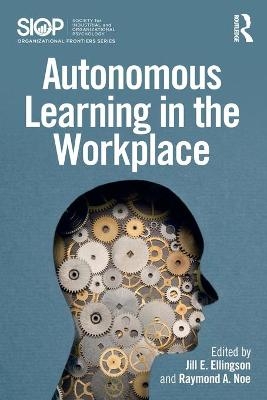
Autonomous Learning in the Workplace
Routledge (Verlag)
978-1-138-94074-1 (ISBN)
Traditionally, organizations and researchers have focused on learning that occurs through formal training and development programs. However, the realities of today’s workplace suggest that it is difficult, if not impossible, for organizations to rely mainly on formal programs for developing human capital.
This volume offers a broad-based treatment of autonomous learning to advance our understanding of learner-driven approaches and how organizations can support them. Contributors in industrial/organizational psychology, management, education, and entrepreneurship bring theoretical perspectives to help us understand autonomous learning and its consequences for individuals and organizations. Chapters consider informal learning, self-directed learning, learning from job challenges, mentoring, Massive Open Online Courses (MOOCs), organizational communities of practice, self-regulation, the role of feedback and errors, and how to capture value from autonomous learning. This book will appeal to scholars, researchers, and practitioners in psychology, management, training and development, and educational psychology.
Jill E. Ellingson is a Professor of Human Resource Management and Dana Anderson Faculty Fellow in the Management Area of the School of Business at the University of Kansas. Raymond A. Noe is the Robert and Anne Hoyt Designated Professor of Management in the Department of Management and Human Resources at The Ohio State University.
1. Autonomous Learning in the Workplace: An Introduction Raymond A. Noe and Jill E. Ellingson Part I: Autonomous Learning: An Evolution toward Technology-Enabled, Learner-Driven, Social, and Experiential Learning 2. Agency in Vicarious Learning at Work Christopher G. Myers and D. Scott DeRue 3. Developing Cultural Intelligence through Autonomous Learning from Cultural Exposure Ming Li 4. A Psychological Model of Learning from Entrepreneurial Failure: Integrating Emotional, Motivational, and Cognitive Factors Christoph Seckler, Rebecca Funken, and Michael M. Gielnik 5. Organizational Communities of Practice and Autonomous Learning John Cordery and Ramon Wenzel 6. Regulating Our Own Learning: Stuff You Did Not Realize You Needed to Know Jeffrey B. Vancouver, Leah R. Halper, and Kyle A. Bayes 7. Strategies for Supporting Self-Regulation during Self-Directed Learning in the Workplace Bradford S. Bell Part II: Organizational and Societal Influences Shaping Autonomous Learning 8. Work Design Growth Model: How Work Characteristics Promote Learning and Development Sharon K. Parker 9. Effects of Human Resource Management on Informal Learning Karin Sanders, Huadong Yang, Helen Shipton, and Timothy Bednall 10. Continuous Development throughout a Career: A Lifespan Perspective on Autonomous Learning Margaret E. Beier, W. Jackeline Torres, and Jacqueline M. Gilberto 11. How Do Conditions Known to Foster Learning in the Workplace Differ across Occupations? Eva Kyndt and Simon Beausaert 12. Informal Learning in the Healthcare Industry: The Detrimental Effects of a Hidden Curriculum Britany N. Telford, Keaton A. Fletcher, and Wendy L. Bedwell 13. The Medium is the Message: On the Emergence of Autonomous Learning, MOOCs, and Technology-Enabled Active Learning Jon Billsberry and Kenneth G. Brown Part III: Effectiveness and Value of Autonomous Learning 14. Failing to Learn from Feedback: Inter- and Intrapersonal Roadblocks to Autonomous Learning Elanor F. Williams and Joyce Ehrlinger 15. Autonomous Learning, Human Capital Resources, and Value Capture Robert E. Ployhart, Matthew L. Call, and Lynn A. McFarland Part IV: Closing Comment 16. Reflections and Future Directions Kurt Kraiger
| Erscheinungsdatum | 28.05.2017 |
|---|---|
| Reihe/Serie | SIOP Organizational Frontiers Series |
| Zusatzinfo | 7 Tables, black and white |
| Verlagsort | London |
| Sprache | englisch |
| Maße | 152 x 229 mm |
| Gewicht | 660 g |
| Themenwelt | Sozialwissenschaften ► Pädagogik ► Allgemeines / Lexika |
| Sozialwissenschaften ► Pädagogik ► Bildungstheorie | |
| Wirtschaft ► Betriebswirtschaft / Management ► Personalwesen | |
| Wirtschaft ► Betriebswirtschaft / Management ► Unternehmensführung / Management | |
| ISBN-10 | 1-138-94074-7 / 1138940747 |
| ISBN-13 | 978-1-138-94074-1 / 9781138940741 |
| Zustand | Neuware |
| Haben Sie eine Frage zum Produkt? |
aus dem Bereich


